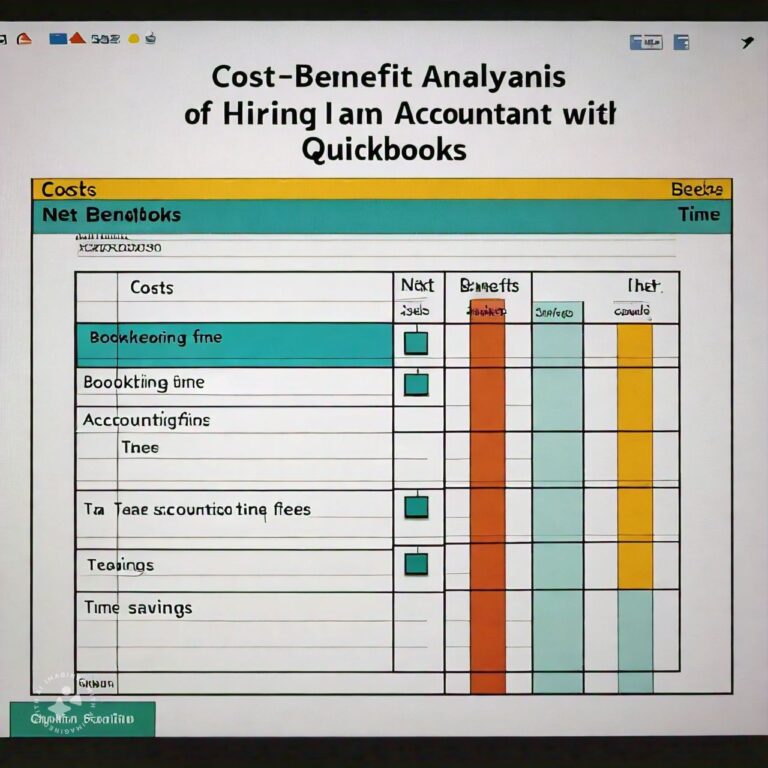Managing your business finances can be challenging, especially when deciding whether to hire an accountant. With digital tools like QuickBooks available, many small business owners question if they need professional accounting expertise. In this blog post, we’ll explore the cost-benefit analysis of hiring an accountant alongside using QuickBooks to help you make an informed decision. So, do you need an accountant with QuickBooks? Let’s find out.
Understanding the Basics of QuickBooks
QuickBooks is a leading accounting software designed for small and medium-sized businesses. It helps manage various financial tasks such as tracking expenses, generating invoices, and creating detailed financial reports. QuickBooks aims to simplify bookkeeping and accounting processes, offering an intuitive platform for managing your business finances. While QuickBooks excels at organizing financial data and automating routine tasks, it’s essential to understand its limitations. It needs to encompass the complete accounting expertise needed for comprehensive financial management. A professional accountant brings a depth of knowledge and analytical skills that surpass software capabilities, providing strategic financial advice and insights that software alone cannot offer.
The Financial Implications of Hiring an Accountant
Hiring an accountant may be a significant expense. However, looking at the bigger picture can lead to considerable financial savings and efficiencies. Here’s how
- Tax Savings: Accountants are well-versed in tax regulations and can identify deductions and credits you might overlook, potentially saving you substantial money.
- Error Prevention: Accountants can help avoid costly mistakes that could lead to fines or legal issues, ensuring your financial records are accurate and compliant with regulations
- Strategic Financial Planning: Accountants can provide valuable insights into financial strategy, helping you optimize resources, streamline operations, and enhance profitability.
- Time Savings: By handling complex financial tasks, accountants free up your time, allowing you to focus on growing your business.
While there is an upfront cost to hiring an accountant, the long-term return on investment can be substantial, making it a financially wise decision.
Evaluating the Non-Financial Benefits of Professional Accounting
Using an accountant alongside QuickBooks brings benefits beyond financial gains. Accountants offer strategic guidance beyond number crunching, becoming valuable advisors for your business. Their expertise helps you make informed decisions, navigating the complexities of business finance. This professional relationship not only lightens your financial management load but also frees up time for focusing on core business activities. Moreover, accountants ensure your business adheres to current financial regulations, instilling confidence in your operations and fostering an environment conducive to creativity and growth.
When QuickBooks Is Enough: Recognizing Your Needs
It’s crucial to assess whether QuickBooks effectively meets your business’s accounting needs. For smaller ventures with straightforward financial transactions, QuickBooks provides robust solutions for basic bookkeeping, generating invoices, and tracking expenses. This software is well-suited for businesses in their early stages or those with uncomplicated financial models. The critical consideration is the complexity of your financial operations and the extent of your accounting requirements. Hiring an accountant may take some time if your transactions are simple and you’re comfortable managing basic financial tasks with QuickBooks. However, you may need more advanced financial insights beyond QuickBooks capabilities as your business grows.
Making the Decision: Questions to Ask Yourself
To decide if do I need an accountant along with QuickBooks, ask yourself these questions:
- Can I manage my business’s financial transactions without professional help?
- Am I confident in maximizing tax benefits and staying compliant with regulations?
- Do I need expert advice on financial strategy to grow my business?
- Does having an accountant provide enough security to justify the cost?
These questions help you understand your financial capabilities and needs. They guide you in deciding whether adding an accountant to your QuickBooks setup fits your business goals.
Wrap It Up
Whether to use an accountant with QuickBooks depends on analyzing your business’s financial situation and goals. QuickBooks handles daily financial tasks well, but an accountant offers more profound insights and strategic guidance. Weigh the benefits of potential tax savings, compliance, and expert advice against the cost of hiring an accountant. For simple or new businesses, QuickBooks might be enough for now. Assess your ability to manage finances, the value of expert strategy, and the peace of mind professional oversight provides. This will help you choose the best financial management strategy for your current and future needs.
